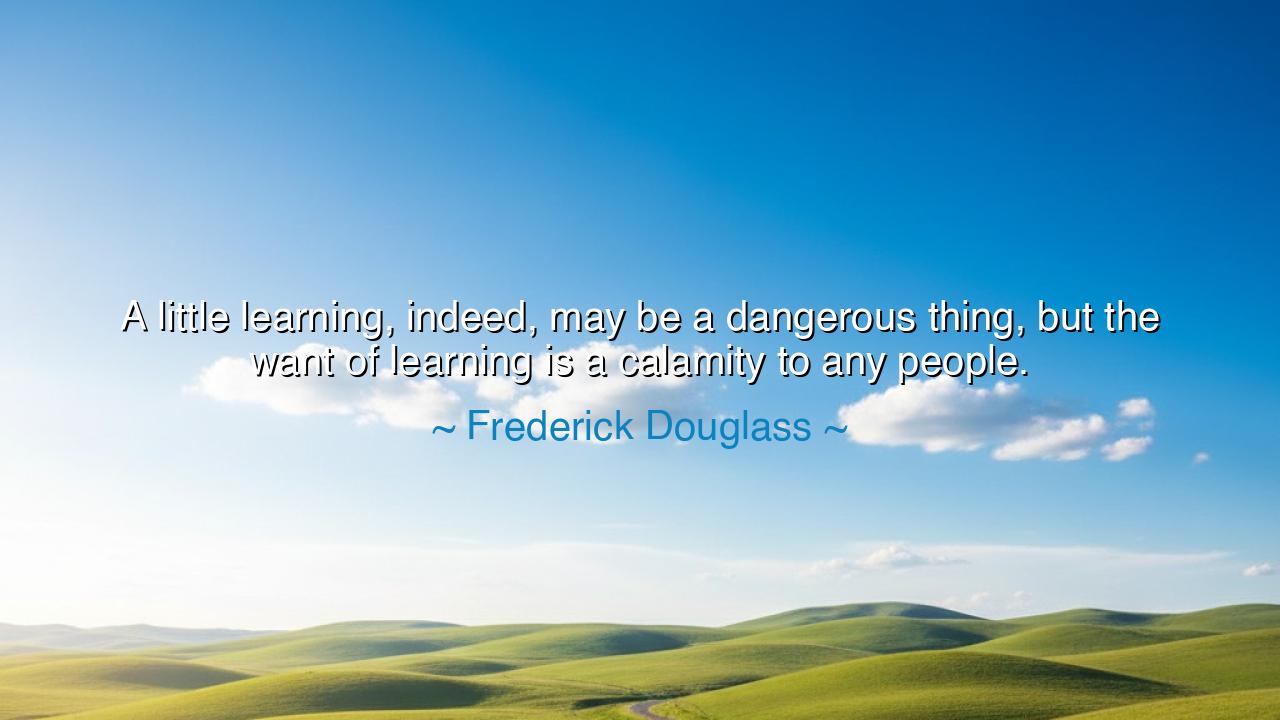
A little learning, indeed, may be a dangerous thing, but the want
A little learning, indeed, may be a dangerous thing, but the want of learning is a calamity to any people.






“A little learning, indeed, may be a dangerous thing, but the want of learning is a calamity to any people,” declared Frederick Douglass, a man born in bondage who rose to become one of the greatest voices of liberty and enlightenment in human history. His words strike like a bell through the corridors of time — a warning and a call. For Douglass knew, through struggle and revelation, that knowledge is both weapon and salvation, that education is not merely the adornment of the mind but the very breath of freedom.
To understand these words, one must see the fires from which they were forged. Frederick Douglass, born enslaved, was denied the right to read or write. Those who enslaved him knew a truth darker than iron: that a man who can read is a man who can think, and a man who can think is a man who cannot be enslaved forever. When Douglass secretly learned the alphabet, when he traced letters in dust and studied words from scraps of newspapers, he was not simply learning language — he was reclaiming his soul. Each word he learned was a chain undone. Each page he read was a step toward liberation. From this sacred struggle came his conviction that learning is the lifeblood of dignity and progress, and that its absence brings ruin to nations and peoples alike.
When he speaks of “a little learning,” Douglass warns of shallow knowledge — of those who sip lightly from the cup of wisdom and mistake its taste for mastery. Such people, inflated with partial understanding, wield knowledge without humility. This is the danger he names: the arrogance of the half-educated, who use words without wisdom and power without conscience. Yet Douglass, unlike many before him, refused to stop there. He went further, proclaiming that the true calamity is not imperfect knowledge, but ignorance itself — the darkness that smothers entire generations when learning is withheld, despised, or destroyed.
History itself stands as witness to this truth. The fall of mighty civilizations has always begun with the silencing of thought. When libraries burned in Alexandria, centuries of knowledge turned to ash, and humanity was cast backward into darkness. When tyrants banned books or forbade education to the poor, they did so to keep power unchallenged. But where learning flourished, freedom followed. The great revolutions of the mind — from the Renaissance to the Enlightenment — were born from the rediscovery of learning, from the courage of those who dared to question, study, and teach. Douglass, who had lived through the night of enforced ignorance, understood that education is light, and where there is no light, there can be no life.
His words also carry a deeper moral — that knowledge must be both sought and shared. It is not enough for one person to learn while others remain in darkness. “The want of learning,” he says, is not merely a personal loss but a calamity to any people — for a nation that neglects education, that starves the minds of its children, will wither from within. No army can save a people who have forgotten how to think; no wealth can sustain a nation that cannot discern truth from falsehood. Learning, then, is the foundation of both liberty and civilization.
Consider how this truth lives in every age. The young girl Malala Yousafzai, like Douglass before her, defied oppression by claiming her right to learn. She was told that education was forbidden to her, yet she held fast to the belief that learning is power — and for that belief, she was attacked, nearly silenced. But her recovery and her voice became a symbol to the world that the hunger for knowledge cannot be killed. Her story and Douglass’s are threads of the same tapestry: proof that the pursuit of learning is a sacred act of rebellion against ignorance and tyranny.
From this wisdom flows a lesson for all who listen. Cherish learning as you would cherish light itself. Seek knowledge not to boast, but to build; not to conquer others, but to free yourself and them. Read deeply, think humbly, and teach generously. Where you find ignorance, bring truth; where you find darkness, carry illumination. Remember always that a mind awakened is a torch that can ignite a nation.
So let Douglass’s words echo in your heart: a little knowledge without humility is dangerous, but the absence of learning is destruction. The true strength of a people lies not in their weapons or wealth, but in their wisdom. Therefore, pursue knowledge as the ancients sought fire — with reverence, with courage, and with endless resolve. For as long as humanity keeps learning, the light will never die, and no people shall live forever in chains.






AAdministratorAdministrator
Welcome, honored guests. Please leave a comment, we will respond soon